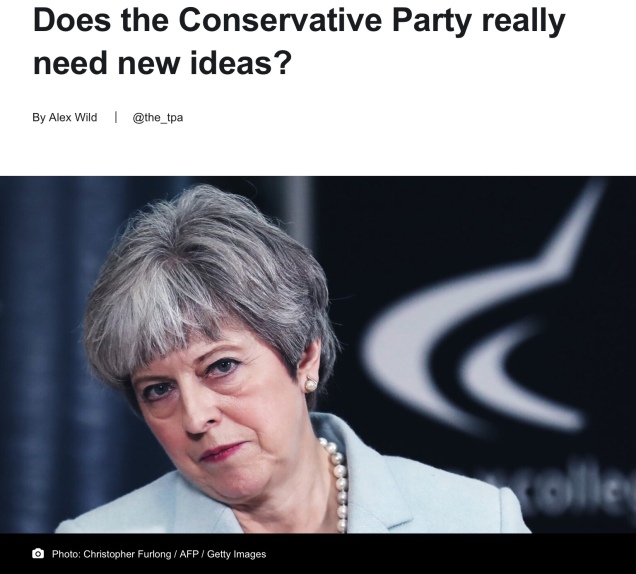
Chuka Umunna? Former choirboy, but most definitely not the Messiah…
In my limited spare time since commencing law school, I have been attending a wonderful Bible study group for graduate students, organized by the university’s Catholic Student Center. Having plodded our way methodically through the New Testament, last week we reached the Book of Revelation and alighted on the topic of the Antichrist – antichrists being false prophets preaching a deceptive gospel, and also a specific figure cloaked in seeming holiness and authority, whose arrival would presage the second coming of Christ.
In other, totally unrelated news, British politics seems to have been roiled in my absence by the defection of eight Labour and three Conservative MPs from their respective parties to form a flashy new association called The Independent Group. In selecting a spokesperson for their group, the breakaway MPs nominated Chuka Umunna, the ex-Labour politician best known for describing himself as Britain’s Barack Obama. As we shall see, this was a revealing choice – elevating a man who models himself on the US president who promised hope and change, delivered the former in spades back in 2008 but so little of the latter by 2016 that the people elected Donald Trump as his successor.
The cast list of TIGgers (yes, they actually call themselves that) on the ex-Labour side is a veritable who’s who of frustrated New Labourite centrists whose slick career ambitions have been put into stasis since Jeremy Corbyn’s takeover of the Labour Party and wholesale rejection of the Blairite/Brownite technocratic tendency (though some credit must be given to MPs such as Luciana Berger, who also had cause to flee the appalling, metastasizing antisemitism within Corbyn’s hard left faction). On the ex-Tory side, we have the likes of Sarah Wollaston and Anna Soubry, politicians whom one would never have guessed to be conservative in the first place but for the fact that they campaigned wearing a blue rosette during general election season.
The TIGgers had a number of justifications for their decision to leave their former parties (though notably, none had the courage to call a by-election and allow their constituents to positively affirm their presence in Parliament under a new party affiliation). Those coming from the Labour Party repeatedly stressed the antisemitism continually exhibited by those close to Jeremy Corbyn and tolerated by the Labour leadership, though their claims that it was the deciding factor fail the credibility test since antisemitism on the hard left and ultra-progressive wings of the Labour Party is hardly a new and surprising issue. More telling is ex-Labour Mike Gapes’ bitter complaint that “the Labour leadership is complicit in facilitating Brexit” – the idea that the Labour Party might support a policy popular among the party’s traditional voter base being too much for him to comprehend. Meanwhile, ex-Tory MPs like Anna Soubry complained about prime minister Theresa May’s dogged approach to Brexit and what they called the party’s reliance on the Hard Brexit fundamentalist ERG group of MPs and a takeover of the party by “right-wing, hard line anti-EU” forces.
All of this was covered portentously and near-reverentially by a Westminster journalistic class who tend to jump at any opportunity to breathlessly report on personalities instead of policy (the details of Brexit still eluding many of them) and which is near-uniformly progressive in socio-economic ideology and stridently anti-Brexit in particular. Thus we were treated to gushing hot takes by the likes of ex-PM Tony Blair (“embrace the spirit of insurgency!“), a Guardian journalist overcome with admiration as these courageous rebels dined at Nando’s, The Scotsman (which swats away inconvenient observations such as the fact that “they have no vision, coherent policy platform or leader”) and readers of the hateful EU propaganda rag The New European, who are desperate for the TIGgers not to subject themselves to by-elections and the indignity of seeking democratic approval of their party betrayal.
Naturally, all of this praise has gone to the TIGgers’ heads, and what started as an act of pure political calculation has now become in their minds an almost heroic declaration of political independence and bold purpose. Hence self-aggrandizing pronouncements such as this:
Heidi Allen thinks that “the two big parties [are] demonstrating more and more every day that they are not up to the challenges facing our country”. This is the same Heidi Allen who campaigned under the Conservative Party banner without a whisper of complaint in 2015 and 2017, maneuvering hard to get that coveted initial constituency selection in the first place.
And here is The Independent Group’s London branch, acting as though it is an oasis of reason in a desert of conformist thinking:
You would think that a brand new political party – a group whose ranks are filled with MPs who had the supposed “courage” to quit their parties and risk the wrath of their constituents because of their overriding concern about the country’s direction – would be positively fizzing with alternative policy ideas and solutions to the national problems they quietly tracked for so long before making their big move. You would be wrong.
But that’s fine. Maybe TIG is understandably reticent to commit themselves by announcing headline policies at this early stage, while they are still trying to woo other potential defectors and grow in strength. We should, though, still be able to parse a sense of what this radical new party stands for by analyzing the famous speeches and policy initiatives of its star members, right? “Oh, Bob? He’s the one who wants to create a network of community colleges to retrain people whose old careers are under threat from globalization and automation.” “Rachel? Isn’t she the one who called for a national Apollo Program for education, criticizing Britain for shooting for the middle with education outcomes and exhorting us to catch up with world leaders like South Korea and Finland?” “Rupert has a great plan for constitutional reform to bring government closer to the people and make leaders more accountable”. “Ayesha actually had the courage to reject calls for her to post a public love-letter to the NHS on Valentine’s Day, saying that we need to stop deifying the healthcare service and look to other countries for examples of best practice”.
Again, tumbleweeds. The British political firmament as a whole is hardly blessed with a multitude of bold, original thinkers, and such figures certainly aren’t among the fabulous seven, the daring eleven or whatever number of forgettable non-entities currently comprise The Independent Group.
All of which is a great pity. As this blog has noted over and over and over and over and over and over again, Britain has entered a period of political discontinuity – a time when the existing political settlement, with its narrow range of policy options, are no longer adequate to the challenges at hand. Such periods of discontinuity require politicians to think the previously unthinkable in terms of policy solutions, not to flee their former political parties in an outrage that people are actually starting to do so.
As described in the influential Stepping Stones report:
In normal times a majority is enough. The task of government is to steer a basically healthy socio-economic system past hazards which are primarily external, while ensuring that the system’s fabric is maintained and making improvements to it here and there.
But once the system itself starts to show signs of fatigue, instability, disintegration, then we start to talk of discontinuity. In discontinuity, solutions can only be found by breaking constraints which we had assumed were unbreakable. It is not enough to settle for policies which cannot save us, on the grounds that they are the only ones which are politically possible or administratively convenient.
So what is The Independent Group’s grand unified theory for fixing Britain? Besides thwarting Brexit, they don’t have one. But they did roll out their very first policy initiative with tremendous fanfare:
Today we launched a petition calling for an end to the Government’s four-year freeze on working age benefits. Ending the freeze on working age benefits would lift 200,000 people – who are working, but struggling to make ends meet – out of poverty.
We believe that all policy should be evidence-based, especially when that policy affects some of the most vulnerable people in our society.
There’s no reason to persist with the final year of the freeze, especially when the past three years significantly exceeded the savings originally envisaged.
Is this the best that the courageous breakaway radical thinkers of British politics can do -a feel-good policy about relaxing benefit freezes? As part of a broader overhaul of welfare policy, this may indeed be a valid and “evidence-based” approach. But The Independent Group have not conducted any such broader review of the welfare system; they simply cherry-picked the low-hanging policy fruit designed to appeal to middle income swing voters, without any consideration of the knock-on effects on public finances, incentives to work or anything else. There’s certainly no bold leadership here, no telling difficult truths to the public about necessary trade-offs in public spending.
Indeed, The Independent Group will not be able to formulate meaningful policy on any number of issues, welfare included, being comprised of defector MPs from opposite parties with different views on the subject. If the party is to survive for any length of time, it would have to strike a balance between the ex-Labour and ex-Tory factions, and would likely produce policies almost identical to any government or opposition which sought to woo the same swing voters by meeting them where they are (rather than doing the much harder – but necessary – job of convincing them that they, too, need to update their thinking about what is both desirable and politically feasible).
Contra Heidi Allen’s complaint that the two main parties are “not up to the challenges facing our country”, The Independent Group exists precisely because the two main parties were captured by forces which seek to overturn the “old established politics” – Labour by the Corbynites with their faith in 1970s-style, red-blooded socialism and the Tories by the ultra free trade zealots of the ERG (though on non-Brexit matters, the Tory Party remains as uninspiringly centrist and authoritarian as it ever was – a fact which Anna Soubry and Sarah Wollaston should have valued, given the fact that they emblemize that sentiment within the party). The two big parties may not yet be responding to this period of discontinuity the right way, but both are shifting their thinking. It is The Independent Group who seek to stand athwart history, yelling “stop!”.
These are not People of Action, bristling at the stultifying ideological confines of their former parties. Rather, they are Captains of Inaction, career machine politicians who thrived on the Old Politics – that comforting bygone era when New Labour would be nanny statist and indulge centre-left interventionist tendencies as the Tories accused them of socialism on steroids, while the Tories would be ever so slightly less nanny statist and interventionist as Labour screamed that they were a libertarian Ayn Rand dystopian outfit made flesh.
However much they may strut and preen, the TIGger MPs are not frustrated free thinkers yearning to push the boundaries of the Overton Window in British politics or advocate for daring new solutions to the problems we face in the early 21st century – they are establishment refugees seeking a lifeboat to take them back to the New Labour, centrist consensus of the 1990s and 2000s. The root of their discontent is not the fact that British politics has become stale and conformist – their anger stems from the fact that the two main political parties have reacted to voter dissatisfaction by moving in direction which reduces their own personal influence (and/or hopes of future high office).
Pete North, welcoming what he sees as the death of centrism, puts it better than me:
Progressivism (whatever that actually means) has become a byword for sanitised cellophane wrapped politics which produces the androgynous clones like Chuka Umunna designed for maximum media inoffensiveness. Like Ken dolls one wonders if these people even possess genitalia. The political version of morning TV magazine show presenters. And as repellent as they are, these people don’t actually know anything.
This much has been made abundantly clear during the course of Brexit. They have no idea why we voted to leave, and no idea how we got where we are, or indeed how to get ourselves out of it. Instead of seeking to understand what is upon us, they have invested all of their energies into sweeping Brexit under the carpet with a view to going back to their consequence free normality where they soak up media attention but take on none of the responsibilities and obligations.
It is telling that the new Independent Group have elected to promote themselves on a handful of recycled populist slogans. They speak of a “different way of doing things” under the “ChangePolitics” hashtag, with all the self-awareness of a diarrhetic hippo. Chris Leslie in all seriousness went on BBC Question Time to tell us “The big political parties want to keep everything as it is” when this bunch are the very essence of the establishment – the rotting corpse of centrism.
Frustration with Britain’s dysfunctional politics is quite understandable, and the growing realization that something has broken beyond repair is encouraging to witness. But to see in the cast of The Independent Group anything resembling salvation from our problems is to put one’s faith in a false prophet.
The politicians who made headlines by flouncing out of their respective political parties aren’t preaching a bold new gospel which the country can get behind. They aren’t currently preaching a message of any kind at all, beyond a furious opposition to Brexit and the inchoate yearning for a return to the time when uttering bland platitudes about Tory heartlessness or Labour profligacy was all it took to sustain one’s political career. If anything, these are avowedly Old Testament politicians, furious with incomprehension that their message no longer resonates in New Testament Britain.
As a general rule of life, it it looks too good to be true, it probably is. The Independent Group doesn’t even manage to look good on cursory examination, but even if one finds oneself falling for their polished Twitter hashtags about changing politics, the point remains that given the rather pitiful raw material at their disposal, The Independent Group’s promise of political renewal is indeed too good to be true – no matter how strongly one wishes that Chuka Umunna and his unlikely gang were the real deal.


–
Agree with this article? Violently disagree? Scroll down to leave a comment.
Follow Semi-Partisan Politics on Twitter, Facebook and Medium.






